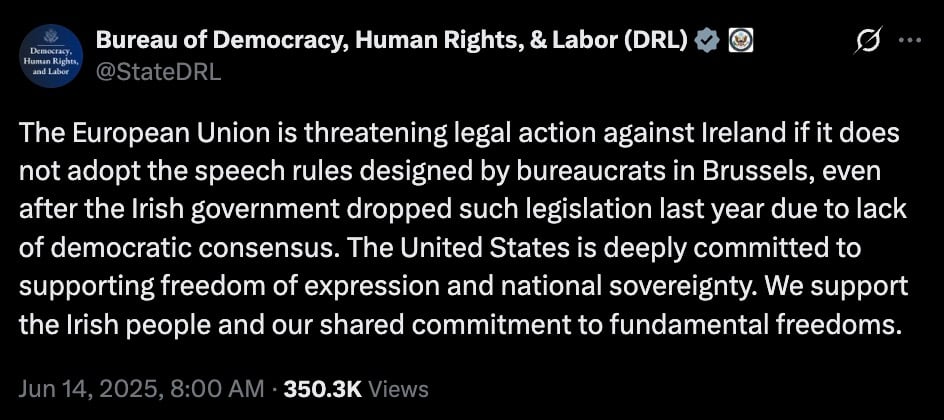US State Department Backs Ireland as EU Threatens Legal Action Over Noncompliance with "Hate Speech" Censorship Laws
Ireland is once again at the forefront of a growing battle over free expression, as the European Union threatens legal action if the country fails to implement controversial hate speech laws. The dispute highlights a deepening divide between centralized EU directives and the sovereignty of member states seeking to preserve open discourse.
The European Commission has given the Irish government a two-month deadline to adopt legislation expanding the definition of “hate speech” to include denial or trivialization of certain international crimes, including the Holocaust.
These changes would bring Irish law in line with EU mandates, but they go far beyond Ireland’s existing legal framework under the Prohibition of Incitement to Hatred Act 1989.
Efforts to pass such laws domestically have already been rejected. Last year, the Irish government backed away from its Criminal Justice (Incitement to Violence or Hatred and Hate Offences) Bill after it failed to garner political support.
Justice Minister Helen McEntee acknowledged the bill’s collapse in September 2024, stating that the hate speech elements lacked the necessary consensus to move forward.
Despite that democratic decision, EU officials are now pressuring Ireland to override its own legislative process. One Irish Member of the European Parliament warned that the Commission’s stance risks stifling public debate, saying, “People resent the fact that they’re threatened with prosecution for expressing their views.” Legal scholars have also condemned the EU’s actions, describing the threat of court proceedings as a clear infringement on Irish sovereignty and a direct contradiction of the public’s will.
Supporters of the EU’s approach argue that the laws are necessary to combat racism and hate online. Yet the broad language of the proposed rules has raised serious concerns about censorship and the potential for abuse. Many fear that politically charged opinions.
The controversy has caught the attention of international observers. The US State Department’s Bureau of Democracy, Human Rights, & Labor weighed in publicly on June 14, writing, “The United States is deeply committed to supporting freedom of expression and national sovereignty. We support the Irish people and our shared commitment to fundamental freedoms.”

That statement reflects a growing awareness of the tension between national self-determination and supranational regulation.
While the EU frames the legislation as a tool to ensure human rights across the bloc, many in Ireland see it as a threat to democratic integrity. Public sentiment has been fierce online, where social media debates often highlight the chilling effect of criminalizing speech that challenges dominant narratives.
Some defenders of speech freedoms argue that legitimate political criticism must not be swept up in the dragnet of overreaching legislation.
Now faced with the prospect of being hauled before the European Court of Justice, Ireland must choose between bowing to Brussels or defending its legislative autonomy. The outcome of this standoff could set a critical precedent for speech protections not only in Ireland but across the entire European Union.